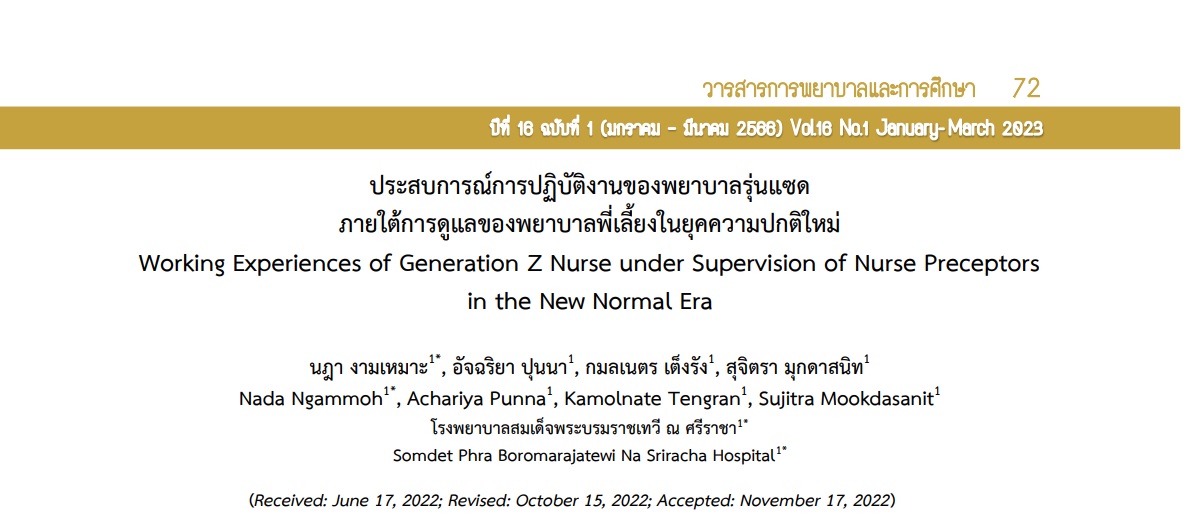ประสบการณ์การปฏิบัติงานของพยาบาลรุ่นแซด ภายใต้การดูแลของพยาบาลพี่เลี้ยงในยุคความปกติใหม่
คำสำคัญ:
พยาบาลรุ่นแซด, พยาบาลพี่เลี้ยง, ยุคความปกติใหม่, การวิจัยเชิงคุณภาพบทคัดย่อ
การวิจัยเชิงคุณภาพนี้ มีวัตถุประสงค์เพื่อศึกษาประสบการณ์การปฏิบัติงานของพยาบาลรุ่นแซด ภายใต้การดูแลของพยาบาลพี่เลี้ยง ในยุคความปกติใหม่ ตามมุมมองของพยาบาลรุ่นแซด โดยใช้ระเบียบวิธีการวิจัยแบบปรากฏการณ์วิทยาการตีความ ตามแนวคิดของไฮเด็กเกอร์ ผู้ให้ข้อมูลหลักเป็นพยาบาลรุ่นแซดที่มีวันเดือนปีเกิดตามบัตรประชาชนตั้งแต่ปีพ.ศ. 2540 – 2555 มีประสบการณ์การปฏิบัติงานพยาบาลเต็มเวลา อย่างน้อย 1 ปีขึ้นไป จำนวน 12 ราย โดยการคัดเลือกผู้ให้ข้อมูลแบบเฉพาะเจาะจง เก็บรวบรวมข้อมูลด้วยวิธีการสัมภาษณ์เชิงลึก การบันทึกเทป การสังเกต และการบันทึกภาคสนาม นำข้อมูลทั้งหมดมาวิเคราะห์เนื้อหาตามวิธีการของแวน มาเนน ผลการวิจัยพบว่า
ประสบการณ์การปฏิบัติงาน ภายใต้การดูแลของพยาบาลพี่เลี้ยง ในยุคความปกติใหม่ ตามมุมมองของพยาบาลรุ่นแซด ประกอบด้วย 6 ประเด็นหลัก ดังนี้ 1) เผชิญกับมรสุมลูกใหม่ในชีวิต 2) เผชิญกับความรุนแรงในที่ทำงาน 3) เผชิญกับความไม่สมดุลของชีวิตการทำงาน 4) ต้องการการสนับสนุน 5) ต้องการพยาบาลพี่เลี้ยงที่มีคุณภาพ และ 6) ต้องการการพัฒนาอย่างต่อเนื่อง
การใช้ประโยชน์ทางการพยาบาล: ผลการศึกษานี้ชี้ให้เห็นว่า พยาบาลรุ่นแซดให้ความสำคัญกับคุณภาพชีวิตและการพัฒนาตนเอง ดังนั้น ผู้บริหารทางการพยาบาลควรส่งเสริมและสร้างคุณภาพชีวิตที่ดี และโอกาสในการเรียนรู้เพื่อพัฒนาทักษะวิชาชีพ เพื่อดึงดูดและรักษาพยาบาลรุ่นแซดไว้กับองค์กร
เอกสารอ้างอิง
Bejtkovský, J. (2016). The Employees of Baby Boomer Generation, Generation X, Generation Y and Generation Z in Selected Czech Corporations as Conceivers of Development and Competitiveness in their Corporation. Journal of Competitiveness, 8(1), 105-123.
Bell, J. A. (2013). Five Generations in the Nursing Workforce: Implications for Nursing Professional Development. Journal of Nurses Professional Development, 29(4), 205-210.
Bencsik, A., Horváth-Csikós, G., & Juhász, T. (2016). Y and Z Generations at Workplaces. Journal of Competitiveness, 8(3), 90-106.
Benner, P., Sutphen, M., Leonard, V., & Day, L. (2009). Educating Nurses: A Call for Radical Transformation. New York: John Wiley & Sons.
Bordignon, M., & Monteiro, M. I. (2021). Analysis of Workplace Violence Against Nursing Professionals and Possibilities for Prevention. Revista Gaúcha de Enfermagem, 42, e20190406. Doi: https://doi.org/10.1590/1983-1447.2021.20190406.
Chicca, J., & Shellenbarger, T. (2018a). Connecting with Generation Z: Approaches in Nursing Education. Teaching and Learning in Nursing, 13(3), 180-184.
Chicca, J., & Shellenbarger, T. (2018b). Generation Z: Approaches and Teaching–Learning Practices for Nursing Professional Development Practitioners. Journal for Nurses in Professional Development, 34(5), 250-256.
Christensen, S. S., Wilson, B. L., & Edelman, L. S. (2018). Can I Relate? A Review and Guide for Nurse Managers in Leading Generations. Journal of Nursing Management, 26(6), 689-695.
Czeisler, M. É., Lane, R. I., Petrosky, E., Wiley, J. F., Christensen, A., Njai, R., et al. (2020). Mental Health, Substance Use, and Suicidal Ideation During the COVID-19 Pandemic-United States, June 24–30, 2020. Morbidity and Mortality Weekly Report, 69(32), 1049-1057.
Dimock, M. (2018). Defining Generations: Where Millennials End and Post-Millennials Begin. Retrieved May 27, 2021 from http://www.pewresearch.org/facttank/2018/03/01/ defining-generations-where-millennials-end-and-post-millennials-begin/.
Dur, N., Akbulut, Z., Eryalcin, O. & Korkmaz, M. (2018). Evaluation of the Violence Experienced by Nurses of Different Generations and their Strategies for Coping with the Stress Resulting from Violence. International Journal of Caring Sciences, 11(3), 1756-1762.
Goh, E. & Lee, C. (2018). A Workforce to be Reckoned With: The Emerging Pivotal Generation Z Hospitality Workforce. International Journal of Hospitality Management, 73, 20-28.
Harrison, P. (2020). Preceptorship: Supporting New Nurses in Transition. Gastrointestinal Nursing, 18(7), 225317795. doi:10.12968/gasn.2020.18.7.50.
Heidegger, M. (1962). Being and Time. New York: Harper.
Hezaveh, M. S., Rafii, F. & Seyedfatemi, N. (2014). Novice Nurses’ Experiences of Unpreparedness at the Beginning of the Work. Global Journal of Health Science, 6(1), 215-222.
Iorgulescu, M. C. (2016). Generation Z and Its Perception of Work. Cross-Cultural Management Journal, 18(1), 47-54.
Jiao, M., Ning, N., Li, Y., Gao, L., Cui, Y., Sun, H., et al. (2015). Workplace Violence Against Nurses in Chinese Hospitals: A Cross-Sectional Survey. BMJ Open, 5(3), 1-9.
Kaihlanen, A. M., Elovainio, M., Haavisto, E., Salminen, L., & Sinervo, T. (2020). Final Clinical Practicum, Transition Experience and Turnover Intentions Among Newly Graduated Nurses: A Cross Sectional Study. Nurse Education Today, 84, 1-9.
Krueger, R. A. & Casey, M. A. (2009). Focus Groups: A Practical Guide for Applied Research. (4th ed.). California: Thousand Oaks.
Kuewong, G., & Oumtanee, A. (2017). Stress of Newly Graduated Nurses Working at an Intensive Care Unit. Journal of the Royal Thai Army Nurses, 18(Suppl 1), 158-165. (in Thai)
Sánchez-Hernández, M. I., González-López, Ó. R., Buenadicha-Mateos, M., & Tato-Jiménez, J. L. (2019). Work-Life Balance in Great Companies and Pending Issues for Engaging New Generations at Work. International Journal of Environmental Research and Public Health, 16(24), 1-18.
Serafin, L., Danilewicz, D., Chyla, P., & Czarkowska-Paczek, B. (2020). What is the Most Needed Competence for Newly Graduated Generation Z Nurses? Focus Groups Study. Nurse Education Today, 94, 104583. Doi: https://doi.org/10.1016/j.nedt.2020.104583.
Shellenbarger, T., & Chicca, J. (2019). A New Generation of Nurses is Here. American Nurse Today, 14(2), 48-50.
Singh, A. P., & Dangmei, J. (2016). Understanding the Generation Z: The Future Workforce. South-Asian Journal of Multidisciplinary Studies, 3(3), 1-5.
Smith-Trudeau, P. (2016). Generation Z Nurses Have Arrived. Are You Ready? New Hampshire Nursing News, 40(2), 13-14.
Stillman, D., & Stillman, J. (2017). Gen Z @ Work: How the Next Generation is Transforming the Workplace. New York: HarperCollins.
Van Manen, M. (1990). Researching Lived Experience: Human Science for an Action Sensitive Pedagogy. New York: State University of New York Press.
Wongthai, S., & Oumtanee, A. (2020). Working with Multi-Generation Colleagues: Perspectives of Generation Z Nurses. Journal of The Royal Thai Army Nurses, 21(1), 96-104. (in Thai)
Woo, W. J. M., & Newman, A. S. (2020). The Experience of Transition from Nursing Students to Newly Graduated Registered Nurses in Singapore. International Journal of Nursing Sciences, 7(1), 81-90.
World Health Organization [WHO]. (2020). Clinical Management of COVID-19. Retrieved May 27, 2021 from https://www.who.int/publications/i/item/clinical-management-of-covid-19.

ดาวน์โหลด
เผยแพร่แล้ว
ฉบับ
ประเภทบทความ
สัญญาอนุญาต
ลิขสิทธิ์ (c) 2022 วารสารการพยาบาลและการศึกษา

อนุญาตภายใต้เงื่อนไข Creative Commons Attribution-NonCommercial-NoDerivatives 4.0 International License.





